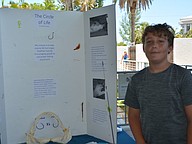- May 8, 2025
-
-
Loading

Loading
Jiselle Sulinski, freshman, did her science project on "Nature's Nursery" and estuary importance.
Photo by Sidra WaliAkiko Campbell, face painter, paints Blair Lee's, 8, face.
Photo by Sidra WaliVolunteer scuba diver Mark Fishman at Mote Laboratory and Aquarium's Ocean Day event.
Photo by Sidra WaliKatelyn Olsen tries to hold a peppermint shrimp.
Photo by Sidra WaliJulie Henry, author of Wisdom from the Wild, started out at Mote as an intern in 1994.
Photo by Sidra Wali
Quinton Perkins's science project was about the circle of life surrounding j-hooks and circle hooks.
Photo by Sidra WaliHailey Redman completed her science project on seabirds.
Photo by Sidra WaliPresley Cochran, Mae Monnot, Grace Suter and Vivkeka Allyne completed their science project on changing people's perspective on sharks and being less scared of them.
Photo by Sidra Wali"Just Catch That" by Aiden Gray and Solomyn Hoinkes
Photo by Sidra WaliSophie Powers and Ashley Redman
Photo by Sidra WaliAshley Aular and Demitria Guimond talk about the zinc sunscreen being the safer option than oxybenzone.
Photo by Sidra WaliAddison Riesen, Brice Claypoole and Luke Lebel served mangrove honey cookies.
Photo by Sidra WaliCoco Claypoole and Elise Kranert
Photo by Sidra WaliAdilaide Pratt completed her science project on harmful plastics.
Photo by Sidra WaliDr. Sara Williams, staff scientist, Isabella Borges and Coral Rodriguez, interns
Photo by Sidra WaliRandall and Martha Wells from the Sarasota Dolphin Research Program
Photo by Sidra WaliDonna Krusenoski of the Sarasota Shell Club
Once wasn’t enough for Mote Marine Laboratory & Aquarium to celebrate World Ocean Day. After Mote partnered with Salt Life on June 8 to host a beach cleanup on Siesta Key for the day-of observance, Mote hosted its own World Ocean Day celebration on June 10 in the aquarium courtyard, with several conservation organizations presenting exhibits.
The 30x30 challenge theme was featured prominently in the courtyard. The campaign encourages the protection of 30% of the world’s oceans by 2030. According to the Ocean Project, only about 8% of the planet’s oceans qualify as highly protected. The international conservation effort seeks to build a worldwide network of protected waters.
“We want to remind people about this wonderful nature and how vital it is to our tourism and in general,” said Sam Douglass, event coordinator.
Donna Krusenoski was on hand from the Sarasota Shell Club to share the organization’s mission, which includes education, community outreach, building respect for the environment and support for ocean-based charities.
Among the group’s efforts, members collect shells. They then sell the artwork and jewelry made from the shells in order to donate to conservation causes and nonprofits. The club also will help identify shells that people find on the beach and would like to know more about.
Many people are surprised to learn that shells have handedness, with most being “right-handed,” explained Krusenoski. The relatively rare lightning whelk, though is sinistral, or left-handed, and can be found on Florida beaches.
“You see this beautiful nature and you can’t resist picking it up,” said Krusenoski.
Randy and Martha Wells were on hand from the Sarasota Dolphin Research Program and shared some of what the organization has learned about the local dolphin population.
The population in Sarasota Bay numbers about 170 dolphins year-round, said Martha Wells. And the program has observed six generations now.
“We’re learning a lot about their relationships. We can look at their communication and other factors that they need to be successful,” said Martha Wells, volunteer.
Part of the organization’s outreach included educating aquarium visitors on best practices at sea to ensure people don’t unintentionally harm marine life.
The No. 1 cause of death for local dolphins is recreational fishing gear, said Randy Wells, Sarasota Dolphin Research Program director and chairman.
“We need to take more responsibility for what we put out there,” said Randy Wells. “We’re all neighbors and we share the environment. We share the same air. The same water. The same fish.”